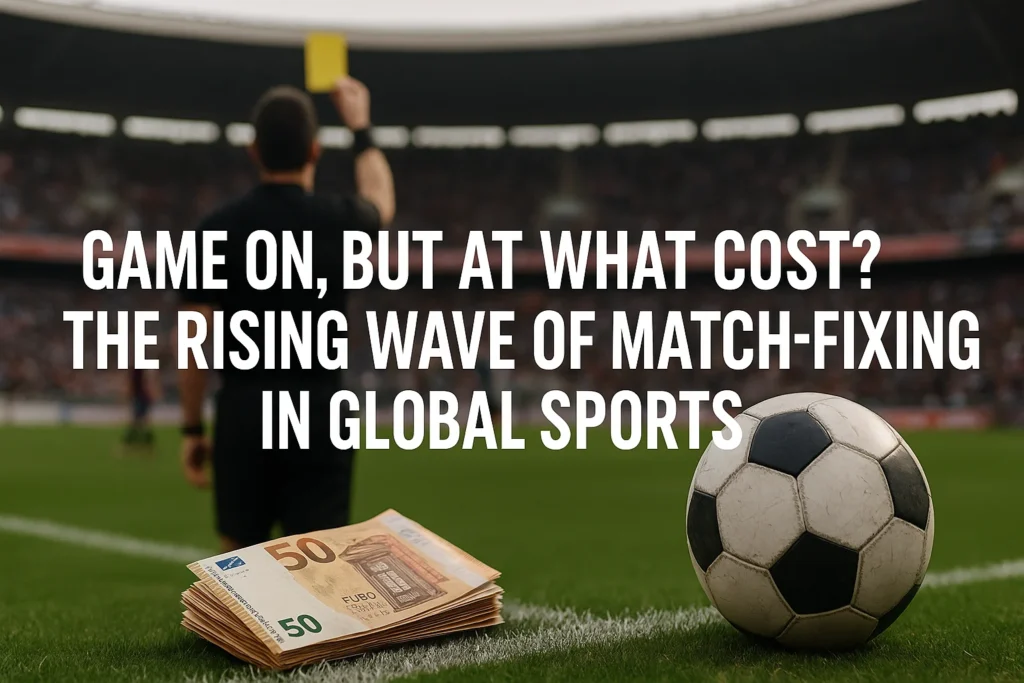The roar of the crowd, the electrifying tension of a penalty shootout, the sheer euphoria of victory, and the crushing agony of defeat – these are the indelible hallmarks of competitive sports, a realm where raw human emotion plays out on a global stage. For generations, sports have stood as a pristine spectacle, a testament to unwavering dedication, unparalleled skill, and the fundamental principle of fair play. Yet, beneath the dazzling stadium lights and the allure of multimillion-dollar contracts, a far more sinister game is unfolding, one that threatens to unravel the very fabric of athletic integrity. Match-fixing, once a hushed rumor whispered in the shadowy corners of back alleys and illicit gambling dens, has metastasized into a pervasive global epidemic, casting a long, dark shadow over the cherished spirit of competition.
From the hallowed pitches where football legends once battled for glory, to the high-stakes arenas of professional tennis where every serve and volley is scrutinized, and even within the rapidly expanding, digitally native universe of esports, the insidious tendrils of corruption are reaching far and wide. This is no longer an isolated incident or the rogue act of a few misguided individuals; it has demonstrably morphed into a sophisticated, highly profitable business model. With the global sports betting market projected to soar beyond an astounding $180 billion by 2026, the allure of manipulating outcomes for immense, illicit financial gain has never been more potent. This presents an almost irresistible temptation for those willing to sacrifice ethics, integrity, and the very soul of sport for illicit profit, pulling the strings of destiny from behind the scenes.
Imagine a grand puppet show, where the strings are pulled not by a benevolent performer seeking to entertain, but by unseen, malevolent forces aiming to deceive. This chilling analogy perfectly captures the grim reality of modern match-fixing. It is not the haphazard work of isolated individuals operating on a whim but a meticulously orchestrated, globalized industry, masterminded by powerful criminal syndicates. These organizations operate with the chilling precision and efficiency of multinational corporations, complete with intricate hierarchies, anonymous investors safeguarding their identities, cunning middlemen facilitating illicit transactions, and even shrewd risk analysts who meticulously calculate the most lucrative avenues for exploiting rigged games, ensuring maximum returns on their nefarious investments.
Consider, for instance, the recent, high-profile revelations in Spain, where astute law enforcement agencies successfully dismantled a formidable Balkan betting syndicate. This shadowy network had systematically infiltrated lower-league football, preying on the financial vulnerabilities of struggling players and coaches. They offered sums as modest as €10,000 per match – a seemingly paltry sum in the grand scheme of professional sports, yet a life-altering amount for many underpaid athletes facing economic hardship. This allowed them to control entire games, determining outcomes long before the first whistle blew. In the cricket-obsessed nation of India, the fervent passion for the sport provides fertile ground for an army of illegal bookmakers, who brazenly utilize encrypted messaging applications to coordinate intricate “spot-fixing” schemes. This nuanced form of manipulation involves rigging specific, seemingly innocuous events within a game, such as a strategically bowled “no-ball,” a pre-determined wide delivery, or even a dropped catch, all meticulously designed to trigger lucrative payouts from pre-arranged bets placed on these minute occurrences. And then there’s the burgeoning, rapidly evolving world of esports, a digital frontier that, due to its explosive growth, relatively nascent regulatory frameworks, and the disconcerting ease of anonymous cryptocurrency transactions, has become a veritable playground for fraudsters seeking to exploit its burgeoning popularity and its impressionable young stars.
The Human Cost: Athletes Caught in a Web of Greed, Desperation, and Coercion
It’s a common and often misleading misconception that every athlete who succumbs to the siren call of match-fixing does so out of unbridled greed, fantasizing about extravagant luxury cars and lavish, carefree lifestyles. The truth, in most cases, is often far more complex, nuanced, and tragically human. Many athletes, particularly those toiling in lower-tier leagues, emerging sports, or developing regions, find themselves in acutely vulnerable positions. They may be struggling with meager wages that barely cover basic necessities, burdened by crushing financial debts, or, even more disturbingly, facing outright coercion and blackmail that leaves them with seemingly no other choice. Their individual stories serve as a stark, poignant reminder of the profound human element at the very heart of this pervasive crisis.
Take, for instance, the poignant confession of a Kenyan cricketer who, with a heavy heart, admitted to accepting a mere $500 to underperform in a match. For him, this seemingly small sum was not about opulence or self-enrichment; it represented months of sustenance for his struggling family, a desperate measure to keep them from abject poverty. Similarly, the harrowing tale of a Romanian tennis player blackmailed into throwing matches after a compromising video surfaced highlights the insidious, destructive power of coercion, where deeply personal vulnerabilities are ruthlessly exploited by manipulative syndicates. And in the burgeoning world of esports, where young, often impressionable gamers, many operating without steady income, robust support systems, or even proper contracts, are lured by the seductive promise of quick cash offers from anonymous “sponsors,” the line between a legitimate opportunity and a predatory exploitation becomes dangerously, irrevocably blurred. These young individuals, often passionately dedicated to their chosen sport, find themselves suddenly trapped in a moral quagmire, forced to make an agonizing choice between upholding their personal integrity and ensuring their immediate financial survival.
Technology: A Double-Edged Sword in the Battle for Integrity
The relentless march of technological innovation, while undoubtedly offering increasingly powerful tools to combat corruption and expose wrongdoing, also, paradoxically, provides increasingly sophisticated instruments for those intent on manipulating outcomes. It’s a high-stakes, perpetual game of cat and mouse, played out on the intricate, ever-evolving digital battlefield, where each side constantly seeks to outmaneuver the other.
On one hand, cutting-edge advancements in Artificial Intelligence (AI) and blockchain technology are being rapidly deployed to detect and flag suspicious betting patterns in real-time, acting as tireless digital watchdogs against fraudulent activity. These systems can analyze vast datasets of betting flows, identify anomalies, and alert authorities before a match even concludes. However, the same technological prowess can be twisted to far more nefarious ends. Imagine the chilling scenario of deepfake audio, flawlessly mimicking a coach’s voice, issuing seemingly legitimate but actually deceptive instructions to a player to intentionally lose a crucial point, miss a vital shot, or yield possession at a critical moment. The revolutionary rise of cryptocurrency, with its foundational promise of decentralization and enhanced anonymity, has, inadvertently, become a significant boon for fixers, enabling untraceable payments that render the work of law enforcement agencies exponentially more challenging and frustrating. Furthermore, the shadowy depths of the dark web have evolved into a clandestine marketplace for corruption, offering secure, encrypted forums where fixers can openly exchange insider tips, recruit vulnerable athletes with enticing offers, and coordinate their illicit schemes with alarming impunity, often beyond the reach of traditional surveillance.
Global Hotspots: Where the Stain of Match-Fixing Runs Deep and Wide
The insidious tentacles of match-fixing are not confined to a single continent or a specific sport; they stretch across the globe, preying on financial vulnerabilities, exploiting cultural passions, and undermining the very essence of fair play in diverse athletic landscapes. Each region presents its unique challenges and characteristics in this pervasive struggle.
Europe: Football’s Perennial Struggle with Corruption and Its Deep Roots
Europe, the undisputed heartland of global football and home to some of the world’s most lucrative leagues, has long grappled with the persistent specter of match-fixing. The infamous “Calciopoli scandal” in Italy, which rocked the football world to its very foundations in 2006, served as a stark, indelible reminder of how deeply corruption could permeate even the highest echelons of the sport, involving top clubs, referees, and league officials. More recently, high-profile arrests and ongoing investigations in countries like Spain and Greece underscore the ongoing, relentless nature of this battle, demonstrating that no league, however prominent, is immune. Lower-league matches are particularly susceptible to manipulation, often operating under significantly less public scrutiny, receiving minimal media attention, and critically, offering much lower player wages, making them ripe targets for criminal syndicates seeking easy returns. Even the revered figures of the game, such as referees, who are entrusted with upholding the rules and ensuring fair play, have been ensnared in these corrupt webs, caught accepting bribes to influence critical VAR decisions, strategically issue yellow or red cards, or even manipulate injury time, thereby subtly altering the course of a match and, consequently, the fortunes of those betting on the outcome.
Asia: The Unseen Underbelly of the Betting Empire and its Cultural Grip
In vast swathes of Asia, particularly in cricket-obsessed nations like India and Pakistan, the sport transcends mere entertainment; it is a profound cultural phenomenon, an ingrained passion, and, critically, a veritable betting goldmine. Here, illegal bookmakers often operate with audacious impunity in certain regions, creating a parallel economy driven by billions of dollars in illicit wagers. “Spot-fixing,” the meticulous manipulation of specific, seemingly minor events within a game, has become alarmingly commonplace, allowing syndicates to profit from pre-arranged outcomes without necessarily fixing the entire match result. The glittering Indian Premier League (IPL), a beacon of cricketing prowess and immense financial might, has itself been repeatedly marred by multiple high-profile scandals, with prominent players, team officials, and even franchise owners caught in elaborate sting operations, their reputations irrevocably tarnished and public trust severely eroded. The sheer volume of betting activity and the cultural significance of the sport make these regions particularly vulnerable to organized criminal exploitation.
Africa: Exploiting the Dreams of the Vulnerable and the Pursuit of Hope
Many African leagues, characterized by critically low player wages, inadequate infrastructure, and often lacking robust oversight mechanisms, present a distressing and fertile ground for match-fixers. Here, the raw, unbridled dreams of young, aspiring athletes, many of whom view sports as their only viable path out of poverty, are often ruthlessly exploited. Predatory “fake agents” dangle the tantalizing promise of lucrative contracts with prestigious European clubs, only to ensnare these hopeful footballers into insidious match-fixing schemes, forcing them to compromise their integrity for a chance at a better life that rarely materializes. The devastating impact of this exploitation is acutely evident in countries like Kenya and Nigeria, where entire local leagues have been tainted by widespread corruption, shattering the trust of loyal fans, discouraging young talent, and irrevocably dimming the aspirations of countless promising athletes.
Esports: The Uncharted Territory of Competitive Gaming and Its Unique Vulnerabilities
The meteoric, unprecedented rise of esports, while undeniably exhilarating and transformative, has also, inadvertently, created a new, largely uncharted frontier for fraudsters. With minimal regulatory frameworks, a predominantly online and global ecosystem, and a player base often consisting of young individuals who lack experience in navigating the complexities of professional contracts or financial ethics, it has become, in many ways, the “Wild West” of competitive gaming. Matches in popular titles like CS:GO and Dota 2 have been demonstrably rigged through a variety of methods, including insider coaching that divulges strategic information to opponents or pre-arranged “throws” where players intentionally underperform, sacrificing victory for illicit gain. The allure of quick, untraceable profits has also led to a disturbing trend where anonymous investors secretly fund esports teams, not for the genuine love of the game or the development of talent, but with the insidious objective of orchestrating fixed outcomes, thereby eroding the fundamental integrity of this rapidly expanding global phenomenon and jeopardizing its future legitimacy.
The Fightback: Can the Soul of Sports Be Reclaimed from the Shadows?
Amidst this disheartening and complex landscape of corruption, a concerted and increasingly powerful counter-offensive is underway. This is a global alliance dedicated to preserving the sanctity of competitive sports and restoring faith in the purity of athletic endeavor. The fight against match-fixing is a testament to the collective determination of international governing bodies, tenacious law enforcement agencies, and even the passionate fans themselves, all united in their resolve to reclaim the true, unblemished spirit of the game.
Global Sporting Bodies Stepping Up with Proactive Measures
Organizations like FIFA, the international governing body of football, and the International Cricket Council (ICC) have implemented a comprehensive battery of new, more stringent anti-corruption measures. Sophisticated real-time betting monitoring systems now meticulously track vast streams of betting data from around the globe, utilizing advanced algorithms to flag suspicious patterns and anomalies even before a match concludes, allowing for immediate intervention and investigation. The threat of lifetime bans for players, coaches, and officials found complicit in fixing schemes serves as a potent and unequivocal deterrent, sending a clear, unambiguous message that such betrayals of trust and integrity will not be tolerated under any circumstances, effectively ending careers and livelihoods.
Law Enforcement Strikes with Precision and International Cooperation
Law enforcement agencies worldwide are significantly escalating their efforts, demonstrating a heightened commitment to disrupting and dismantling these intricate criminal networks. Interpol’s monumental “Operation SOGA V,” for instance, stands as a prime example of successful international collaboration, having successfully crippled a sprawling $2.1 billion Asian gambling syndicate, dealing a massive blow to the illicit enterprise’s financial arteries. In Spain, the Guardia Civil has taken a pioneering step by establishing a dedicated sports corruption unit, a specialized force designed to proactively investigate and prosecute those who seek to undermine the integrity of sports, showcasing a focused, strategic approach to combating this particular form of organized crime.
Whistleblower Programs: Breaking the Code of Silence and Empowering the Voiceless
Crucial to the success of this fight is the empowerment of those on the inside – the athletes, officials, and even disgruntled members of criminal syndicates who possess vital information. Anonymous hotlines and secure, encrypted reporting channels have been established, allowing players and officials to report fixing attempts and existing schemes without fear of retaliation, reprisal, or damage to their careers. These whistleblower programs are proving invaluable in uncovering intricate, hidden schemes and bringing perpetrators to justice, acting as a crucial intelligence pipeline that penetrates the veil of secrecy surrounding these operations.
The Role of Fans: The Ultimate Guardians and the Unyielding Watchdogs
Perhaps the most potent and often underestimated force in this monumental battle lies with the fans themselves. When trust erodes, when the gnawing suspicion of a fixed match looms large, fan engagement inevitably dwindles, attendance drops, merchandise sales plummet, and leagues ultimately suffer immense financial losses and irreparable reputational damage. The collective outrage expressed through social media, online forums, and traditional media over suspicious match outcomes has increasingly compelled sports organizations to act swiftly and decisively, recognizing that the fundamental integrity of the game is inextricably linked to the unwavering belief and passionate loyalty of its global supporters. Fans, in essence, are the ultimate watchdogs, their collective voice a powerful deterrent against corruption.
Conclusion: A Game of Enduring Significance and an Ongoing Battle for Its Soul
Match-fixing is not merely a criminal act; it is a profound and unforgivable betrayal of every fan who cherishes the fundamental principles of fair competition, every athlete who dedicates their life to honest effort and strives for genuine excellence, and every coach who inspires their team to achieve greatness through legitimate means. While the relentless march of technological innovation, coupled with the tenacious and increasingly sophisticated efforts of law enforcement agencies, are making discernible progress in detecting and disrupting these illicit operations, the war against corruption in sports is far from over. It is an ongoing, evolving conflict.
The critical question that hangs heavy in the air, echoing in every stadium and every online arena, is this: Can sports truly reclaim their pristine integrity, shaking off the pervasive taint of manipulation and deceit? Or will the insidious forces of greed and corruption ultimately emerge as the undisputed, albeit morally bankrupt, champions, forever altering the landscape of competitive athletics? The very soul of competitive sport hangs precariously in the balance, a delicate equilibrium between the pursuit of genuine excellence and the corrosive, destructive allure of illicit gain. The ultimate outcome of this profound struggle will determine whether the essence of sport continues to inspire generations, or if it slowly but irrevocably succumbs to the shadows.
Key Takeaways
- A Soaring Threat: According to Interpol, match-fixing incidents have surged by a staggering 50% since 2022, underscoring the escalating and increasingly organized nature of this global crisis.
- A Web of Deceit: Criminal networks employ a sophisticated arsenal of tactics, including substantial financial bribes, insidious blackmail, and advanced technological tools like deepfakes and cryptocurrencies, to systematically rig matches and manipulate outcomes.
- Vulnerable Targets: Esports and lower-tier leagues, often characterized by nascent regulatory frameworks, less robust oversight, and financially vulnerable athletes, remain particularly susceptible to exploitation by these cunning criminal enterprises.
- A United Front: Leading international organizations such as FIFA and Interpol, alongside vital whistleblower programs and the vigilant eyes of fans, are actively engaged in a fierce, multi-faceted battle against corruption – but the war for sports’ integrity is far from reaching its conclusive chapter; it is an ongoing vigilance.
For those who wish to delve deeper into this critical issue and understand the complexities of the fight against it, further reading can be found in Interpol’s comprehensive Global Match-Fixing Report, FIFA’s detailed Anti-Corruption Initiatives, and insightful reports on how the rapidly expanding esports industry is valiantly battling fraud and striving for integrity.
The game is far from over, but the clock is unequivocally ticking. The integrity of sports, a cherished beacon of human endeavor, passion, and fair play, awaits its ultimate fate in this defining contest.




I’ve been exploring for a little bit for any high-quality articles or blog posts on this sort of area . Exploring in Yahoo I at last stumbled upon this web site. Reading this information So i am happy to convey that I’ve a very good uncanny feeling I discovered exactly what I needed. I most certainly will make sure to do not forget this web site and give it a glance regularly.